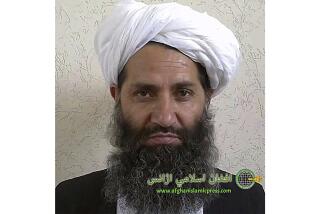Dalai Lama Calls for a New Era of Ethics
- Share via
Calling the gap between rich and poor “one of America’s weaknesses,” His Holiness the Dalai Lama of Tibet on Wednesday urged corporate executives to donate part of their profits to education, health care and other social services.
In a keynote lecture at the Pasadena Civic Auditorium on “Ethics for a New Millennium,” he also called for a greater commitment to nonviolence, religious tolerance and “inner disarmament of anger and jealousy.”
“Let’s make the next century a century of dialogue,” he said. “This century, whether we like it or not, has been one of violence.”
Earlier on the fourth day of his Los Angeles-area visit, the Dalai Lama held a news conference in San Marino at which reporters solicited his views on everything from relations with China and the conflict in East Timor to corruption in Mexico and the meaning of spiritual emptiness.
At the conference, the Dalai Lama criticized missionary efforts to propagate religion, saying that they are outdated and could lead to sectarian clashes at a time of growing interfaith relations.
“Conversion, I believe, is something like imposing your faith on others,” he said. Noting reports that some missionaries in places such as Mongolia are paying people who convert, he said: “This is wrong.”
He also bemoaned current consumer trends that exploit religion for profit, such as “power beads” fashioned after the Tibetan rosary known as the mala. And he called for schools and Hollywood to promote the ethics of compassion.
The Dalai Lama’s public appearances on his sixth visit to Southern California conclude today with a religious initiation ceremony in Pasadena.
In a packed schedule of events, the 64-year-old Buddhist monk has moved people to laugh and cry, and to wish for blessings and healing from afflictions ranging from terminal cancer to chronic fatigue.
At one venue, Allison Zamora, a Roman Catholic who described herself as Buddhist “in my heart,” tearfully hailed the simplicity of his teachings. At another site, retired business manager Nikki Grant, a Jew, gleefully declared: “Marvelous, marvelous! The man radiates an unbelievable energy. He will convert me! He stands a good chance!”
The Dalai Lama’s reception has amazed longtime supporters such as Tseten Phanucharas, a hospital administrator in Santa Monica. She remembers the days when politicians would not meet with him; today, the Clinton administration has a special coordinator for Tibetan affairs charged with bringing about negotiations with the Chinese.
Two decades ago, Phanucharas recalled, the Dalai Lama was largely unrecognized when he visited Los Angeles; he met with only two dozen Tibetan exiles in a rundown center off Vermont Avenue. Now Tibet support groups have proliferated around the world. Membership in the Washington-based International Campaign for Tibet, for instance, has grown to 50,000 from 7,000 in 1994. And two of the Dalai Lama’s books are national best-sellers.
During this Los Angeles visit, the Dalai Lama displayed his mastery of myriad roles as social commentator, moral philosopher, religious teacher and political leader.
At a star-studded gala sponsored by the International Campaign for Tibet on Monday night, the Dalai Lama was a gentle statesman. He urged Chinese leaders to recognize that freeing Tibet from its nearly 50-year occupation was the surest path to national stability and unity. Power derived from justice is long-lasting, he said, while rule at the point of a gun is temporary--”but very decisive!”
That quip drew laughs from the standing-room-only crowd of more than 1,500--which included actress Sharon Stone, former Vice President Walter Mondale, U.S. Sen. Dianne Feinstein and former French First Lady Danielle Mitterrand.
At his sold-out Buddhist teach-in in Pasadena, the Dalai Lama was a religious teacher, the 14th incarnation of the Buddha of Compassion. Atop a throne draped with brocades of red and gold, he spoke to 3,200 students on such matters as the destructive impact of negative emotions.
The Dalai Lama, in the most obviously religious of his public events, taught the “Path of Liberation Teachings” by Tibetan master Lama Tsong Khapa. He explained concepts such as the renunciation of desire.
On Monday, before a diverse audience at Sinai Temple, he had whittled down his 2,500-year tradition to its bare essence when asked to explain Buddhism in one sentence--or “standing on one foot,” as a Jewish sage was asked to do with his faith two millenniums ago.
“Hmmm,” the Dalai Lama said, drawing laughs. Then he turned serious.
“The essence is: If you can, help others. If not, then at least refrain from hurting others.”
More to Read
Sign up for Essential California
The most important California stories and recommendations in your inbox every morning.
You may occasionally receive promotional content from the Los Angeles Times.













